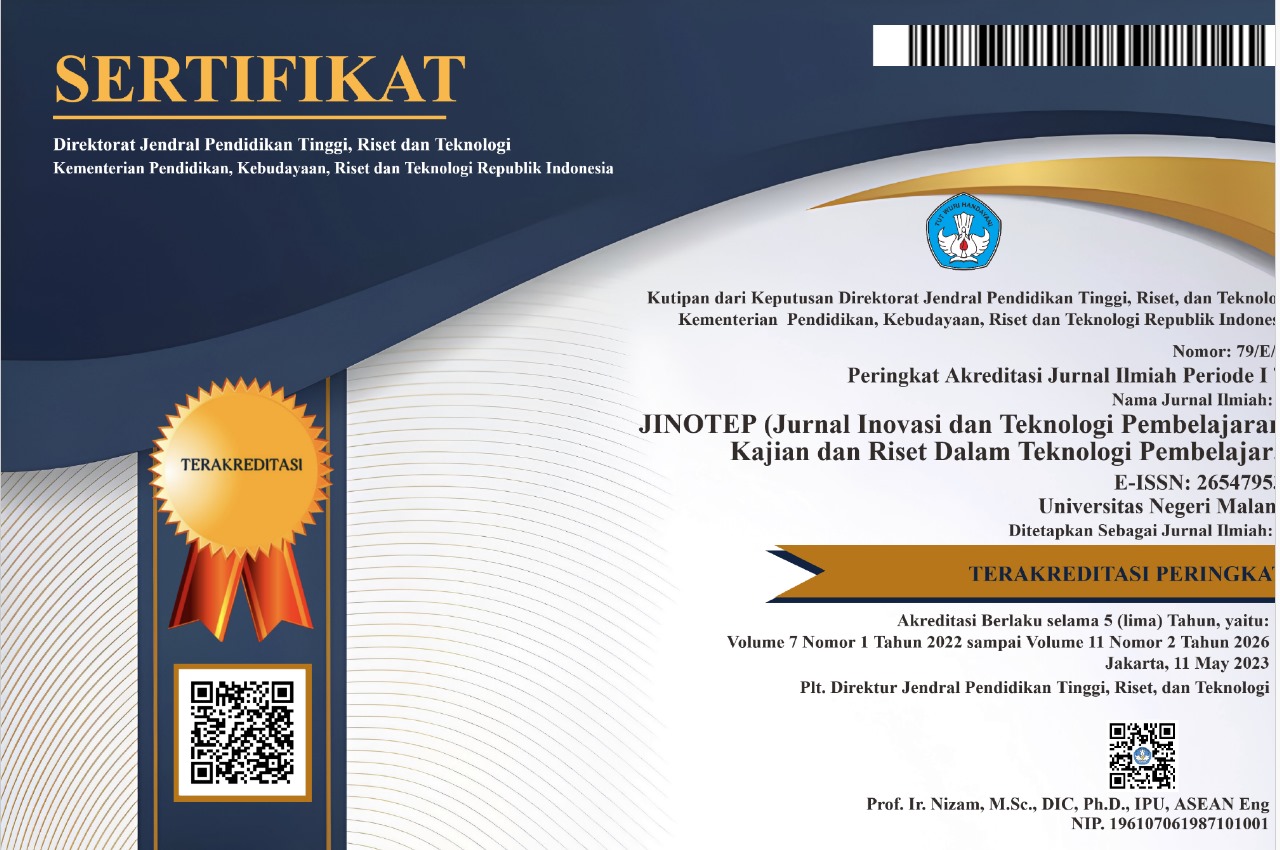Challenges in Operating University Moodle E-Learning: A Case Study from Lecturers’ Perceptions
Abstract
Abstrak: Penelitian bertujuan untuk menginvestigasi persepsi tentang kesulitan dosen Pendidikan Bahasa Inggris yang menggunakan E-learning Moodle Undiksha dalam mata kuliah pedagogi, literature, reading dan writing. Penelitian ini menggunakan metode mix dan lebih kepada pendekatan kualitatif. Peneliti menggunakan kuisioner dan panduan interview saat pengumpulan data. Dosen Pendidikan Bahasa Inggris merupakan partisipan dalam penelitian ini. Hasil penelitian menunjukan ada enam masalah yang ditemui oleh dosen saat menggunakan E-learning Moodle Undiksha yang di kategorikan menjadi internal dan external. Kesulitan internal yang ditemui berupa tidak adanya fitur auto-refresh, konferensi video, pesan suara dan mengedit secara berkesinambungan. Sedangkan untuk halangan external diantaranya sikap buruk plagiarism dan partisipasi pasif dari mahasiswa
Abstract: This research aimed to investigate the perceptions about challenges that are encountered by English Language Education lecturers using the Undiksha Moodle e-learning in pedagogy, literature, reading, and writing course. This study used an embedded mixed-method case study with qualitative dominant. Questionnaire and semi-structured interviews were used by the researcher in collecting the data. The participants were the lecturers of English Language Education. The findings manifested that there were six challenges that were encountered by the lecturers during operating the Undiksha Moodle e-learning that could be categorized into internal and external. The internal challenges such as the absence of several features like auto-refresh, video conference, voice message recording, and editing synchronously. While the external challenges were the bad attitude of the plagiarism act and students’ passive participation
Keywords
Full Text:
PDFReferences
Aldowah, H., Ghazal, S., & Muniandy, B. (2015). Issues and Challenges of Using E-Learning in a Yemeni Public University. Indian Journal of Science and Technology, 8(32), 1–9. https://doi.org/10.17485/ijst/2015/v8i32/92160
Anolu, C. O. (2019). Lecturers’ Percpetion of the Usefulness of Computer-Based Examination in Tertiary Instituions in Edo State, Nigeria. Journal of Chemical Information and Modeling, 53(9), 1689–1699. Retrieved from https://doi.org/10.37745/ijeld.2019
Arkorful, V., & Abaidoo, N. (2015). The role of e-learning, advantages and disadvantages of its adoption in higher education. International Journal of Instructional Technology and Distance Learning, 12(1), 29–42. https://doi.org/org/10.1007/s11528-007-0025-9.
Ary, D. J. (2010). Introduction to Research in Education. Belmont: WADSWORTH Cengage learning.
Astuti, E. P. (2019). Schoology and its contribution in english learning. 3rd English Language and Literature International Conference (ELLiC), 3, 64–70.
Bakia, M. (2010). Internet-based education. International Encyclopedia of Education, 102–108. https://doi.org/10.1016/B978-0-08-044894-7.00755-7
Barhoumi, C. (2020). The Effectiveness of WhatsApp Mobile Learning Activities Guided by Activty Theory on Students’ Knowldege Management. Contemporary Educational Technology, 6(3), 221–238. https://doi.org/10.30935/cedtech/6151
Cakrawati, L. M. (2017). Students’ Perceptions on the Use of Online Learning Platforms in EFL Classroom. English Language Teaching and Technology Journal (ELT-Tech Journal, 1(1), 22–30. Retrieved from https://doi.org/10.17509/elt tech.v1i1.9428
Çepik, Ş., Gönen, K., & Sazak, M. K. (2016). ELT instructors’ attitudes towards the use of Blended Learning in tertiary level English language programs. Journal of Human Sciences, 13(1), 1715. https://doi.org/10.14687/ijhs.v13i1.3719
D. Davies, F. (1989). Perceived Usefulness, Perceived Ease of Use, and User Acceptance of Information Technology. Delle Vicende Dell’agricoltura in Italia; Studio e Note Di C. Bertagnolli., 13(3), 319–340. https://doi.org/10.5962/bhl.title.33621
Denzin, N. (2010). The Fundamental the greater triangulation the, the greater confidence in the observed findings .
Given, L. M. (2008). Qualitative Researach Methods. California: SAGE Publications, Inc.
Efriana, L. (2021). Problems of Online Learning during Covid-19 Pandemic in EFL Classroom and the Solution. Journal of English Language Teaching and Literature, 2(1), 39.
Heffernan, T. A., & Heffernan, A. (2019). The academic exodus: the role of institutional support in academics leaving universities and the academy. Professional Development in Education, 45(1), 102–113. https://doi.org/10.1080/19415257.2018.1474491
Isik, A. (2009). Perceptions of Students and Teachers Aabout the Use of E-learning/Sharing Portal in Edcuational Activities. Aspectos Generales De La Planificación Tributaria En Venezuela, 2009(75), 31–47.
Jung, I. (2011). The dimensions of e-learning quality: From the learner’s perspective. Educational Technology Research and Development, 59(4), 445–464. https://doi.org/10.1007/s11423-010-9171-4
Kocdar, S., Karadeniz, A., Peytcheva-Forsyth, R., & Stoeva, V. (2018). Cheating and Plagiarism in E-Assessment: Students’ Perspectives. Open Praxis, 10(3), 221. https://doi.org/10.5944/openpraxis.10.3.873
Lestiyanawati, R., & Widyantoro, A. (2020). Strategies and Problems Faced by Indonesian Teachers in Conducting E- Learning System During COVID-19 Outbreak. Journal of Culture, Literature, Linguistic and English Teaching, 2(1), 71–82.
Lopez, S. J., & Louis, M. C. (2009). The Principles of Strengths-Based Education. Journal of College and Character, 10(4). https://doi.org/10.2202/1940-1639.1041
Mamattah, R. S. (2016). StudeMamattah, R. S. (2016). Students’ Perceptions of E-Learning. 52. https://www.diva-portal.org/smash/get/diva2:925978/FULLTEXT01.pdfnts’ Perceptions of E-Learning. 52. Retrieved from https://www.diva-portal.org/smash/get/diva2:925978/FULLTEXT01.pdf
Nedeva, V., Dineva, S., & Atanasov, S. (2014). Effective E-learning Course With Web Conferencing. Proceedings of V-Th National Conference of E-Learning. https://doi.org/10.13140/2.1.2605.6648
Ningsih, S. (2020). Persepsi Mahasiswa Terhadap Pembelajaran Daring Pada Masa Pandemi Covid-19. JINOTEP (Jurnal Inovasi Dan Teknologi Pembelajaran): Kajian Dan Riset Dalam Teknologi Pembelajaran, 7(2), 124–132. https://doi.org/10.17977/um031v7i22020p124
Nugraha, I. G. N. A. R. D., Santosa, M. H., & Paramartha, A. A. G. Y. (2020). a Study of Indonesian Lecturers’ Perception on Student Plagiarism. SAGA: Journal of English Language Teaching and Applied Linguistics, 1(2), 81–94. https://doi.org/10.21460/saga.2020.12.53
Nwosu, L. I., & Chukwuere, J. E. (2020). the Attitude of Students Towards Plagiarism in Online Learning: a Narrative Literature Review. Gender & Behaviour, 18(1), 14675–14688. Retrieved from https://search.ebscohost.com.ezproxy.ecae.ac.ae/login.aspx?direct=true&db=asn&AN=144348055&site=ehost-live
Qureshi, I. A., Ilyas, K., Yasmin, R., & Whitty, M. (2012). Challenges of implementing e-learning in a Pakistani university. Knowledge Management and E-Learning, 4(3), 310–324. https://doi.org/10.34105/j.kmel.2012.04.025
Rahayu, R. P., & Wirza, Y. (2020). Teachers’ Perception of Online Learning during Pandemic Covid-19. Jurnal Penelitian Pendidikan, 20(3), 392–406. https://doi.org/10.17509/jpp.v20i3.29226
Rao, P. S. (2019). The importance of english in the modern era. Asian Journal of Multidimensional Research (AJMR), 8(1), 7. https://doi.org/10.5958/2278-4853.2019.00001.6
Sharma, S. (2011). Role of ICT in the Process of Teaching and Learning. Journal of Education and Practice, 2(5), 1–6. Retrieved from https://www.ripublication.com/ijeis16/ijeisv6n1_01.pdf
Supriadi, D., & Sa, U. S. (2017). The Effectiveness of Implementing Information and Communication Technology on Student Academic Services ( A Case Study in Bandung Institute of Technology for the 2015-2016 Period ). 9(2), 139–148.
Touchie, H. Y. (1986). Second Language Learning Errors Their Types, Causes, and Treatment. JALT Journal, 8(1), 75–80.
Utami, I. G. A. L. P. U. (2018). The Online Learning of Teacher Profession Education Program (PPG) for In-service English Teachers: Challenges and Accelerated Learning Factors. Jurnal Pendidikan Indonesia, 7(2), 145–153. https://doi.org/10.23887/jpi-undiksha.v7i2.15650
Wilson, M., Wnuk, K., Silvander, J., & Gorschek, T. (2018). A literature review on the effectiveness and efficiency of business modeling. In E-Informatica Software Engineering Journal (Vol. 12). https://doi.org/10.5277/e-Inf180111
Yan, S. (2021). COVID-19 and technology use by teenagers: A case study. Human Behavior and Emerging Technologies, 3(1), 185–193. https://doi.org/10.1002/hbe2.236
Zboun, J. S., & Farrah, M. (2021). Students ’ Perspectives of Online Language Learning During Corona Pandemic : Benefits and Challenges. 7(1).
Zulfahmi MD, Sarwo. Taknduklangi, A. M. (2018). An analysis of Lecturer Perception on the Use of E-learning for English Instruction in IAIN Kendari. 3(2).
DOI: http://dx.doi.org/10.17977/um031v8i12021p080
Refbacks
- There are currently no refbacks.
Copyright (c) 2021 I Putu Juliana, I.G.A Lokita Purnamika Utami, Ida Ayu Made Istri Utami

This work is licensed under a Creative Commons Attribution-ShareAlike 4.0 International License.
======================================================================
Jurnal Inovasi dan Teknologi Pembelajaran published by Universitas Negeri Malang in collaboration with the Asosiasi Program Studi Teknologi Pendidikan Indonesia (APS TPI) and Ikatan Profesi Teknologi Pendidikan Indonesia (IPTPI) with a MoU.
Publisher Address:
Educational Technology Laboratorium, Building D5, 1st Floor
Faculty of Education, Universitas Negeri Malang
Semarang St. No. 5, Malang City, East Java Province, Postal Code 65145
Email: jinotep.fip@um.ac.id
======================================================================

JINOTEP is licensed under a Creative Commons Attribution-ShareAlike 4.0 International License.
JINOTEP Statistics (Since July 13th, 2020)



.png)




.png)
1.png)
1.png)
4.png)
2.png)
1.png)
1.png)
.png)


_3.png)





1.png)
.png)